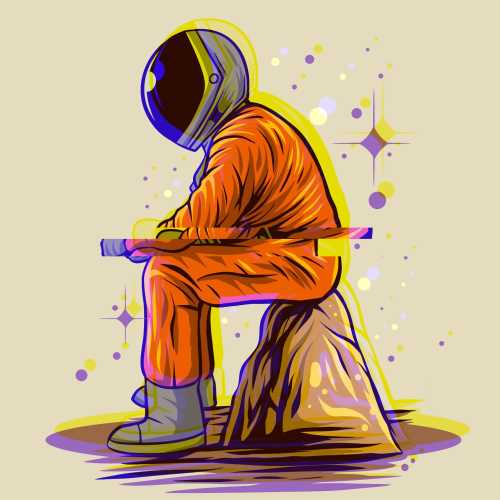First, a disclaimer: this won’t be a feel-good read. In fact, what I’m about to reflect on is probably one of the saddest stories in computer history. Few people know about Gary Kildall, though his contributions to the world of personal computers were invaluable.
Back in the early 80s, IBM decided to create their own PC brand but there was only one problem: they didn’t have an operating system. Young 25-year-old Bill Gates had recently created his company, Microsoft. IBM turned to Gates to see if he could come up with a solution to their problem.
At that time, Gary Kildall was already known for creating the first-ever operating system, the Control Program for Microcomputers, or CPM. Gary was a computer scientist, holding a degree in Mathematics and a Ph.D. in Computer Science, had an already established company, Digital Research Incorporated (DRI), and was 13 years older than Gates.
When IBM approached Microsoft, Bill first pointed them to Kildall. Being under a strict non-disclosure agreement, he then called Gary and said: “Someone is coming to see you. Treat them well, they are important people.”
Do you know the father of the programmable computer and the winner of the "weirdest" programming language?
The story says that Kildall, who was more of an inventor than a businessman, didn’t take Bill’s advice too seriously and was out flying one of his private planes when IBM showed up at his doorstep. Seeing he wasn’t home, they proceeded to pressure his wife, Dorothy, to sign an NDA stating that IBM was never here. She refused.
Feeling angry and frustrated, they returned to Bill Gates and pressed him again to see if Microsoft could develop an OS for the IBM PC. Bill was not about to give Gary a second chance and he accepted the deal.
But here’s what Gates did: he bought a program from a small software company called the Quick and Dirty Operating System (or Q-DOS), for the price of 75,000$. Q-DOS was, in fact, a ripoff of Gary’s CPM program.
He then changed its name to MS-DOS (Microsoft DOS) and licensed it to IBM. A year later, IBM’s personal computers entered the market and MS-DOS was sold alongside each one of them.
Realising what Microsoft had done, Gary threatened to sue IBM for copyright infringement. This prompted the company to strike a deal with him and DRI: CPM would now be offered for sale alongside MS-DOS. The terms seemed fair and Gary was satisfied: customers could now choose which operating system they wanted on their machines…
But there was a catch: CPM was offered to customers alongside MS-DOS, yes, but while MS-DOS sold for 40$, CPM sold for the steep price of 240$. This price discrepancy caused CPM’s death.
Now, Gary Killdal is remembered mostly for being “the man who could’ve been Bill Gates”. His “mistake” of not being home the day IBM came to visit him is referred to as “one of the biggest business failures in history”.
Or was it?
...
Is there more to this story than what we now remember?
“Ask Bill [Gates] why the string in [MS-DOS] function 9 is terminated by a dollar sign. Ask him, because he can’t answer. Only I know that.”
— Bill Gates: Of Mind and Money, Seattle Post-Intelligencer Newspaper, May 8, 1991
In 1995, a TV documentary was released as a tribute to Gary’s life, who passed on July 11, 1994. In it, there are direct accounts of people who knew him personally and have their own take on the events of that day:
Gary was, indeed, flying one of his private planes, but not because he disregarded the importance of the meeting. He was attending another important meeting with one of his employees, Tom Rolander. They then returned to Gary’s house and were, in fact, present when IBM arrived but their non-disclosure terms seemed so unacceptable, they refused to sign it.
Gary’s friends and co-workers say he was someone with an incredibly open-minded work ethic. He was way ahead of his time in that matter and his ethics resembled more the one of the open-source community today, rather than one of a competitive businessman.
What Can We Learn From Gary’s Incredible (But Sad) Story

Deep down, probably many of us are scared to think we could make a similar mistake out of laziness or negligence. But hearing the way his co-workers talk about him can give us a completely different perspective.
At the time of these events, Microsoft was only a small startup company. It makes sense to think that someone so early in his career would see a deal with IBM as a huge opportunity, especially someone concerned more by the financial success of the company than driven by a desire to innovate.
On the other hand, Gary was already highly respected for his numerous contributions (besides CPM, he’s also responsible for developing the BIOS system and the CD-ROM technology containing the first-ever digital encyclopedia). Is it possible he chose to act according to his stellar work ethic by treating each opportunity equally?
Maybe Gary’s eagerness to openly share his knowledge and excitement about his inventions is sadly what made his downfall. Or maybe his mistake came in sharing his work with the wrong people.
...
Gary died at the age of 52, plagued by incessant judgments on his way of handling the IBM deal, driving him to depression and alcoholism.
The year prior to his death, he wrote a book called “Computer Connections” in which he apparently exposes his version of the story. Unfortunately, he passed away before it could go to print. The manuscript now belongs to his children who chose not to publish the book, apart from the first few chapters.
“I expected too much of educators. I expected them to understand, in a sense, the sugar-coated concepts of LISP used in AI that were embodied in the Logo language. It was then that I learned that computers were built to make money, not minds.” — Gary Kildall


